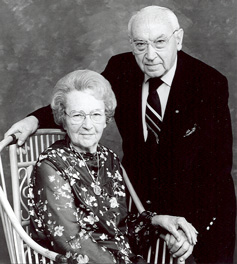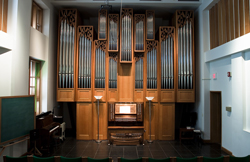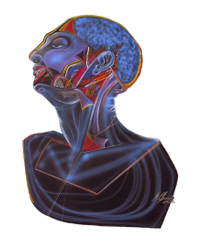Kilian Schmitt: A Fortune Built, a Fortune Shared

He started out with nothing, but he was always grateful for what he had... He felt that he should return that to society...
Roger Lathan, Schmitt Foundation Director
The late Kilian J. Schmitt, entrepreneur, public benefactor, and founder of the Kilian J. and Caroline F. Schmitt Foundation, is affectionately described by those who knew him in many ways. He was a true gentleman who believed in personal sacrifice and giving for the greater good, a friendly, cordial and kind fellow with a wry sense of humor who loved hamburgers and Mercedes with equal enthusiasm, and a brilliant investor who was also modest, unassuming, trustworthy and straightforward – a very down-to-earth guy...
Table of Contents
 Kilian was born February 10, 1906 in the small Bavarian town of Hundsfeld, Germany, which was located near Würzburg, a medium-sized, culturally and historically rich city in central Germany. Situated on the banks of the River Main, Würzburg is surrounded by vineyards.
Kilian was born February 10, 1906 in the small Bavarian town of Hundsfeld, Germany, which was located near Würzburg, a medium-sized, culturally and historically rich city in central Germany. Situated on the banks of the River Main, Würzburg is surrounded by vineyards.
The grandson of Hundsfeld's mayor, Kilian grew up during a time of prosperity in Germany as his country bloomed into a strong industrial nation. Yet Kilian also experienced life in a country preparing for, and attempting to recover from, the devastating effects of World War I. Inflation, shortages and painful restorations were all familiar to Kilian and his contemporaries.
He would always be very loyal to the people who helped him out.
- Bob Fella, Schmitt Foundation President
Herman Fella, father of Schmitt Foundation President, Bob Fella, was a childhood friend of Kilian's. Herman had already left Hundsfeld for America, and he encouraged Kilian, as well as his own brother, Leo (Schmitt Foundation Director Leon Fella's father), to join him. Herman loaned Kilian $220 to pay his passage. Kilian arrived in Rochester, New York, on October 12, 1925.
The young immigrants lived together or in the same area in the early years, and provided support and friendship to one another all their lives. As for their homeland, Kilian's grandfather sold Hundsfeld's Bad Lands to the Kaiser. The land was later acquired by Hitler, who demolished Hundsfeld to build an expanded army training camp.
Undaunted by the prospect of learning a new language, Kilian enrolled at Washington Junior High School to learn English. As he became more proficient, he attended night school at the Mechanics Institute, the precursor to today's Rochester Institute of Technology (RIT), studying mechanical engineering and management, and graduating in 1933.
While he was a student, Kilian worked as a sausage maker at Rochester Packing Company and later in the tool and die industry. He was determined to pay off the loan Herman had given him and to build a life for himself in America.
In 1931, in the midst of the Depression, a chance comment by a friend in real estate changed Kilian's future. This friend talked of a newfangled notion - space in the city specifically designated for leaving a car while the driver worked, shopped or visited. The shrewd investor in Kilian envisioned the potential for this idea, perhaps recognizing that, after the Depression, the demand for automobiles and thus parking lots would grow.
Kilian's first lot was a small one on Clinton Avenue North, opposite the Claridge Hotel. While building this new venture, he worked hard to earn a living, laboring at tool making full time at Bausch and Lomb Optical Company, and at a variety of part time jobs, including raising chickens.
In 1939 he married the former Caroline Stock. Childless, Kilian and Caroline were devoted to one another for over 50 years, working as a team in both business and philanthropic pursuits. In fact, Caroline ran the parking lots while Kilian worked at his other jobs, doing everything from handling the business details to parking cars.
Once people began buying and driving cars again after World War II, Kilian returned to his parking lot business full time, by then known as United Schmitt Corporation. At one point, he owned nearly every key parking lot in Rochester. Kilian's firm expanded into real estate investment, ultimately merging quite profitably with Houston's Allright Auto Parks Company.
At this point, Kilian's fortune was indeed made, and he began to share it with many other people.
The Schmitts provided for themselves adequately. I never saw anything in their personal lives that was opulent or overdone. I really think that Kilian felt that as long as they were well taken care of, that he’d really like to be able to benefit others who were in much greater need.
- Mike Walker, Schmitt Foundation Vice President
By all accounts, Kilian was a remarkable businessman with an extraordinary eye for opportunity and an uncanny ability to invest well. Caroline, the more reserved of the two, was businesslike and a tough negotiator,
while Kilian was warmer and friendlier. Yet as astute and successful as the Schmitts were, they also had a strong sense of responsibility to both their community and the peoples of the world.
The causes Kilian and Caroline supported both during their lifetimes and through their Foundation are many and varied, including most prominently educational institutions such as the University of Rochester, RIT and Nazareth College; the University of Rochester Medical Center, and numerous initiatives promoting improved relations between the US and Germany.
Kilian and Caroline were also devoted parishioners at St. Mary's Catholic Church - Kilian was an usher for 25 years. They donated chimes for the church, as well as an endowment for their maintenance. Bob Fella tells how Kilian enjoyed celebrating the Oktoberfest, He would encourage people to come to Oktoberfest mass at St. Mary’s. After that, he'd invite the Board and a few other special guests to a private cocktail party in the rectory...then we'd all go to the Oktoberfest, as Kilian's guests.
The world needs more religion and education, and I want to help a bit.
- Kilian J. Schmitt, 17 May 1985, RIT Interfaith Center Dedication
Kilian seemed to empathize with people of different nationalities and religions living in the United States, perhaps because of his own experience as an immigrant. His alma mater, RIT, hosted a diverse student body - 19 religious denominations in 1985. When he was approached about funding an interfaith center at RIT, he initially felt it was too expensive, but Caroline convinced him it was important that there be a place where everyone could worship on campus.
Ultimately, they did fund the Kilian J. and Caroline F. Schmitt Interfaith Center. On groundbreaking day, when Kilian received one of the shovels used in the ceremony, he smiled and said with a laugh, This is the most expensive shovel I ever bought!
Along the same lines, the Schmitts also funded the crafting of a world map for the RIT College Alumni Union. Made from wood from other countries representing the homes of students from all over the world, the map is yet another tribute to the diversity of the RIT student body. In addition, they supported the Kilian and Caroline Schmitt International Scholarship at RIT.
Nazareth College also enjoyed the Schmitts' generosity, including receiving a 25 - tone carillon and an organ. Nazareth students also benefit from scholarships funded by the Foundation.
To say Kilian was active in his community is an understatement. A committed Rotarian, Kilian had 21 years of perfect attendance at meetings, and helped to create a fishing pond at the Rotary Club's Sunshine Camp. The Masonic Lodge of Monroe County named him Man of the Year in 1983. He was also the president of the local chapter of the Steuben Society of America, a civic group for US citizens of German heritage, founded fittingly enough on the cornerstones of Duty, Justice, Charity, and Tolerance.
Among many other community - related activities, Kilian helped the YMCA buy a building on Hudson Avenue for their Outreach program in 1960.
It also appears Kilian was one of those people who just loved what he did for a living. With the exception of a little gardening, his favorite hobby or pastime was investing.
Kilian had no particular interest in doing for himself. If he walked into your living room, you wouldn't think this was a wealthy man. He always wore the same sport coat – he was not a natty dresser, shall we say. He lived very modestly, very unpretentiously. - Roger Lathan
In contrast to their extreme generosity to others, both Kilian and Caroline were also known for their frugality, but only as it applied to their own personal needs. There are many affectionately recounted humorous anecdotes about Kilian and Caroline's attitudes towards excess, which belied their status as millionaires.
Mike Walker recalls Caroline fretting over ordering both a hamburger and soup for lunch for fear she wouldn't be able to finish everything that had been paid for. Roger Lathan tells of traveling to visit Kilian at his home in a Florida retirement community, My wife and I wanted to treat him to dinner, but he said, 'No, no, we're going to eat here - I've already paid for these meals!'
Kilian's favorite food was typical of his humble nature, the quintessentially American hamburger.
Kilian did afford himself one luxury, according to Roger: True to his German heritage, he loved German cars, in particular, the Mercedes he bought for himself.
His [Kilian's] contribution to German–American education cannot be measured in money alone. There is the personal interest he takes in each student he helps. Mr. and Mrs. Schmitt have been in loco parentis to many of the scholarship holders.... - Dr. Lewis Beck in 1970, philosophy professor, University of Rochester
When Kilian's mother was critically ill in 1950, he returned to Germany to visit her. He was dismayed by the negative attitudes he observed post-war Germans had towards Americans and the United States.
The Schmitts began sponsoring German students at the University of Rochester in an attempt to improve relations between the two countries. Each student was to spend one year in the United States, then return to Germany to share an enlightened view of the US with others in Germany.
This expanded into an exchange program between the University of Würzburg, founded 600 years ago, and the University of Rochester. The exchange went on for 20 years, from 1952 - 1972.
As was typical of the modest Schmitts, they insisted on being anonymous for the first 10 years of their sponsorship. They only revealed themselves as the benefactors of these students when they were persuaded that publicizing their generous example would encourage others to participate. In recognition of his many contributions, Kilian was awarded the second University of Rochester Associates Medal in 1965.
Kilian kept his ties to Germany intact in other ways as well. He initiated and helped to establish a Sister City relationship between Rochester and Würzburg (1964). As chairman of the coordinating committee, Kilian facilitated an exchange program between Rochester and Würzburg that sponsored more than 100 high school students each way. Among other activities, he also supported the Third International Kant Congress (1970), which brought Germany’s leading philosophers together at the University of Rochester
He was recognized with West Germany-s highest civilian honor, the Knights- Cross of the Order of Merit, in 1971, with honorary citizenship of the University of Würzburg and the title, Honorary Mayor of Würzburg.
He was not looking for recognition, although in the end we've given him a lot of recognition, but it was because he deserved it, not because he asked for it.
- Roger Lathan
Kilian owned the parking lot behind the University of Rochester's Eastman School of Music. As a good businessman as well as a patron, he wanted to support the Eastman while ensuring it remained downtown - he was very interested in preserving and promoting the downtown district.
 The result of that interest was The Kilian and Caroline Schmitt Organ Recital Hall, which has been well used by students and the site of many special events, since the Schmitts sponsored its renovation and donated the pipe organ. In commemoration of that gift, a portrait of the Schmitts commissioned by the U of R hangs in the school's gallery.
The result of that interest was The Kilian and Caroline Schmitt Organ Recital Hall, which has been well used by students and the site of many special events, since the Schmitts sponsored its renovation and donated the pipe organ. In commemoration of that gift, a portrait of the Schmitts commissioned by the U of R hangs in the school's gallery.
Kilian didn't understand any better than you or I would what was being discussed at the [Brain-Endocrine Interaction] symposia, but he realized that the brain held a lot of secrets to the health and well being of mankind and that further research and study in that area could be very, very important for the future. So he became interested in that and supported that. The Foundation continues to support it to this day. - Roger Lathan
 Kilian supported a series of distinguished Brain-Endocrine Interaction Symposia, offered by the University of Rochester School of Medicine and Dentistry's Department of Anatomy (now the Department of Neurobiology and Anatomy), and dedicated to providing a forum for leading scientists to introduce new ideas. The first of these symposia took place in Munich, West Germany, in 1971. Others followed at three-year intervals, in locations such as Tokyo, Würzburg and Rochester.
Kilian supported a series of distinguished Brain-Endocrine Interaction Symposia, offered by the University of Rochester School of Medicine and Dentistry's Department of Anatomy (now the Department of Neurobiology and Anatomy), and dedicated to providing a forum for leading scientists to introduce new ideas. The first of these symposia took place in Munich, West Germany, in 1971. Others followed at three-year intervals, in locations such as Tokyo, Würzburg and Rochester.
Today, that interest has expanded to yield two legacies. First is the endowment of the Kilian J. and Caroline F. Schmitt Chair in Neurobiology and Anatomy, and second is the Kilian J. and Caroline F. Schmitt Program on Integrative Brain Research at the University of Rochester. The latter is an extraordinary new program dedicated to the understanding of the nervous system and its disorders. The program supports not only symposia, but also interdisciplinary research collaborations that cross traditional boundaries within the University’s neuroscience community. In addition, it facilitates the training and development of young neuroscientists at the University and brings distinguished visiting professors to the campus to enhance and enrich the research environment.
Kilian and Caroline were very community focused. They had done a number of things during their lifetimes for charitable causes, and made it every clear that they wanted that to continue after their deaths. –Mike Walker
Kilian and Caroline retired to the Ft. Lauderdale, Florida, area, then to Lake Worth, eventually living in a retirement facility. In the early ’80s, Kilian decided to form a charitable foundation to ensure his assets were used to support the causes he cared so deeply for in his lifetime. He surrounded himself with friends and associates on the Foundation’s Board – the children of his lifelong friends, such as Bob and Leon Fella and Jim Dray, and people he trusted whom he’d come in contact with in business, such as Mike Walker, Skip Hallenbeck and Gary Lindsay, or through his charitable activities, such as Roger Lathan.
I think he’d [Kilian] be pleased because we try very hard to invest, or put the money in the causes that they were close to.” –Bob Fella
After Kilian passed away on February 22, 1990 and Caroline passed away shortly thereafter, on May 10, 1990, their ashes were interred at the Interfaith Chapel at RIT – there’s a plaque memorializing them at the entranceway to the chapel. Virtually all of their estates went to the Foundation. Today, the Board seeks to maintain the Schmitts’ original intentions, focusing primarily on medical research and educational activities. Roger Lathan sums up Kilian and what he stood for quite nicely:
Kilian was a very old–fashioned person. He was very proud of being an American... a kind and caring person who would help anyone in need. He was a very lovely man.